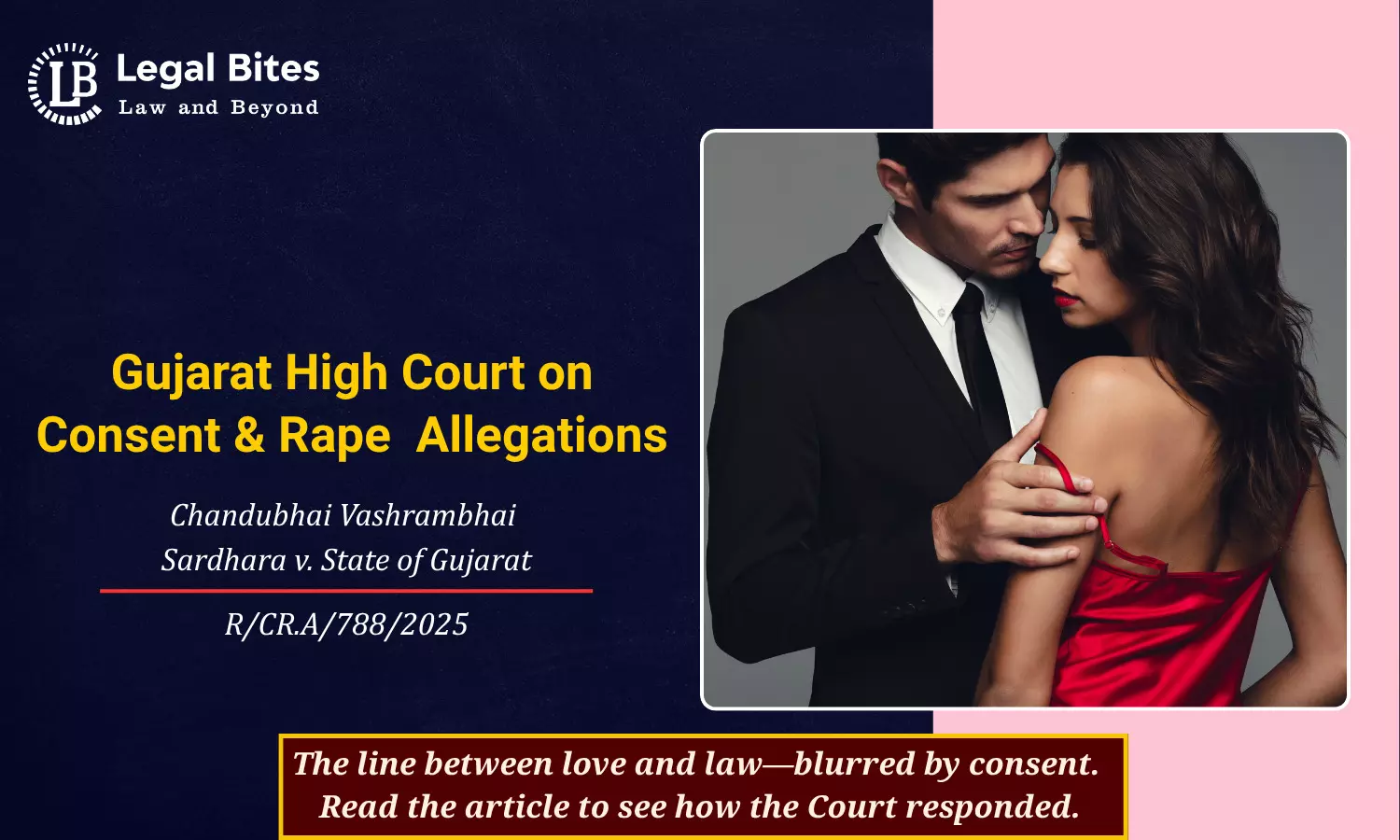Does Consent Tilt the Balance of Convenience Toward the Accused in Rape Cases?
This article analyses a Gujarat High Court ruling on whether consent, delay in reporting, and prior relationship justified granting bail in a rape case.

In a notable judgment in Chandubhai Vashrambhai Sardhara (Patel) v. State of Gujarat & Anr (2025), the Gujarat High Court examined the complex interplay between consent, delay in filing an FIR, and bail in a case involving allegations of repeated rape under Section 376(2)(n) IPC and the SC/ST (Prevention of Atrocities) Act. The Court's ruling raises critical legal and social questions: When does consent matter? Can a consensual relationship later turn into a claim of rape? And more importantly, can consent tip the scales in favour of granting bail to the accused?
Background of the Case
The case arises from FIR No. 11203007230124/2023, filed at Bheshan Police Station, Junagadh, in which the complainant accused her employer, the appellant, of repeated rape over one month. Interestingly, the FIR was filed a month after the alleged incidents, raising immediate questions about delay and motive.
The complainant and the accused were both married and reportedly knew each other for some time, working in close proximity. A consensual quashing petition was initially filed, accompanied by an affidavit of settlement, which led to the quashing of the proceedings. However, the complainant later challenged that order before the Supreme Court, which remanded the case back to the High Court for a fresh decision.
Arguments by the Appellant
Advocates Zubin Bharda and team, appearing for the accused, made several submissions in favour of bail:
- Delay in FIR: There was an unexplained one-month delay between the alleged incidents and the filing of the FIR. The defence argued that such delay casts doubt on the veracity of the allegations.
- Consensual Relationship: The accused submitted that the relationship was consensual and stemmed from a mutual extramarital affair. This was supported by the medical examination, where the accused reportedly admitted to having consensual intercourse with the complainant.
- Change of Mind and Settlement: After initial proceedings were quashed based on a consent affidavit, the complainant changed her mind for reasons not disclosed clearly, leading to a fresh round of litigation.
- No Immediate Resistance: It was argued that if the complainant was indeed raped, she had ample opportunity to raise alarm—especially during one alleged incident where she was on the terrace with her husband and children.
- Prolonged Custody: The accused had already spent significant time in judicial custody—first from April 2023, and then post-surrender in February 2025. The trial had not yet begun.
The defence stressed that continuing to keep the accused in jail would amount to an abuse of process of law in a case where the facts suggest the possibility of a consensual relationship gone sour.
Submissions by the Complainant
On the other hand, advocate A.J. Yagnik, representing the complainant, vehemently opposed the bail application:
- Vulnerable Victim: The complainant was an illiterate tribal woman, working as a labourer in the accused’s fields. Her linguistic, economic, and social disadvantages made her susceptible to coercion.
- Duress and Coercion: It was alleged that the accused took advantage of her dependency and forced her into a non-consensual relationship, treating her like "his commodity".
- Fraud in Settlement: The defence's reliance on a settlement affidavit was rebutted. The complainant claimed she was misled by a social worker under the pretext of receiving government compensation for SC/ST rape victims. She claimed to have placed her thumb impression without understanding the legal consequences.
- Statutory Presumption: The complainant invoked the proviso to Section 3(1)(w) of the SC/ST (Prevention of Atrocities) Act, arguing that silence or lack of resistance cannot be equated with consent, especially where coercion and socio-economic imbalance exist.
- Pursuit of Justice: The complainant had actively pursued the case, taking it to the Supreme Court and then back to the High Court, showing her determination to seek justice.
Legal Consideration: When Does Repetition Become Rape?
The Court delved into Section 376(2)(n) IPC, which provides enhanced punishment for repeated acts of rape on the same woman. However, the judgment highlights a subtle but important legal threshold: Repetition alone is not sufficient—each act must lack consent.
The Court explained that if the alleged repeated acts occur over a time where the complainant is otherwise free to move, communicate, and resist—but does not do so—this raises a presumption of consent. The presence of consent, even as a possibility, weakens the prosecution’s claim at the bail stage.
Observations by the Court
Justice Divyesh A. Joshi made several key observations:
- Both parties were mature adults (around 30 years), familiar with each other, and capable of understanding the implications of their actions.
- The complainant did not raise any alarm despite opportunities, particularly during the alleged night-time incident on the terrace.
- The relationship was ongoing for about a month, during which the complainant remained silent.
- In such scenarios, when “a slightest element of consent comes into picture,” the balance of convenience tilts towards the accused while deciding bail.
- This line of reasoning forms the crux of the judgment, which emphasises that presumptive consent, delay in reporting, and prolonged incarceration favour the grant of bail.
Grant of Bail and Conditions
In granting bail to the accused, the Court imposed several conditions:
- ₹15,000 bond and one surety.
- Surrender of passport.
- Restriction on travel outside Gujarat.
- Mandatory marking of presence before police.
- Prohibition from entering the village of the complainant for six months, except for court-related purposes.
The Court also noted that its observations were prima facie and not binding on the trial court, which will independently assess the evidence.
Analysis: What Does the Judgment Say About Consent?
This judgment reflects a growing trend in Indian bail jurisprudence—evaluating sexual offences through the lens of autonomy, mutual history, delay, and behavioural cues rather than a simplistic reading of the FIR.
While the Court did not absolve the accused or comment on the trial merits, it clarified that consent, or even the hint of it, matters in bail decisions, especially when:
- The complainant is an adult;
- There’s a significant delay in reporting;
- No physical resistance or alarm is raised;
- Medical or documentary evidence does not strongly support the allegation of force.
Key Highlights of the Decision
Justice Divyesh A. Joshi stated:
"Reverting to the case on hand, the applicant-accused and the complainant was in relationship past one month and she knew the applicant-accused since long time. Moreover, the applicant is languishing in jail since 01.02.2025, and before that, spent considerable period in judicial custody since 02.04.2023 till the proceedings was quashed and then restored by the order of the Hon’ble Apex Court, and as such, considering the period of incarceration already spent by the applicant in two parts, in my opinion, he deserves to be released on bail."
Implications for Future Cases
Delayed FIRs Under Scrutiny: Courts may view delayed reporting of sexual offences—especially where there's a history of voluntary contact—with greater scepticism during bail hearings.
- Bail vs. Trial: The judgment reaffirms that bail proceedings do not adjudicate guilt but weigh the balance of convenience, risk, and justice.
- Consent Is Not Binary: In adult relationships, especially extramarital or workplace affairs, consent may be implied by conduct unless clear coercion is proven.
- Vulnerable Complainants Still Protected: While the Court considered consent, it did not discount the complainant’s claim of coercion. Its cautious framing shows courts remain alert to misuse of power and influence.
- Caveats Apply: The judgment only allowed bail—it didn’t adjudicate the core issue of rape. The trial court is free to evaluate all evidence independently.
Conclusion
Gujarat High Court’s decision in Chandubhai Vashrambhai Sardhara v. State of Gujarat highlights a nuanced and evolving approach toward consent in sexual offence cases. The Court observed that when an element of consent appears—even marginally—it impacts the decision on bail. However, this doesn’t amount to a final ruling on guilt.
Ultimately, the judgment reflects a judicial effort to balance the presumption of innocence with the seriousness of sexual violence, ensuring that justice is neither rushed nor denied. It also raises a pertinent legal question: How do courts draw the line between coercion and consent when power, poverty, and silence intersect?

